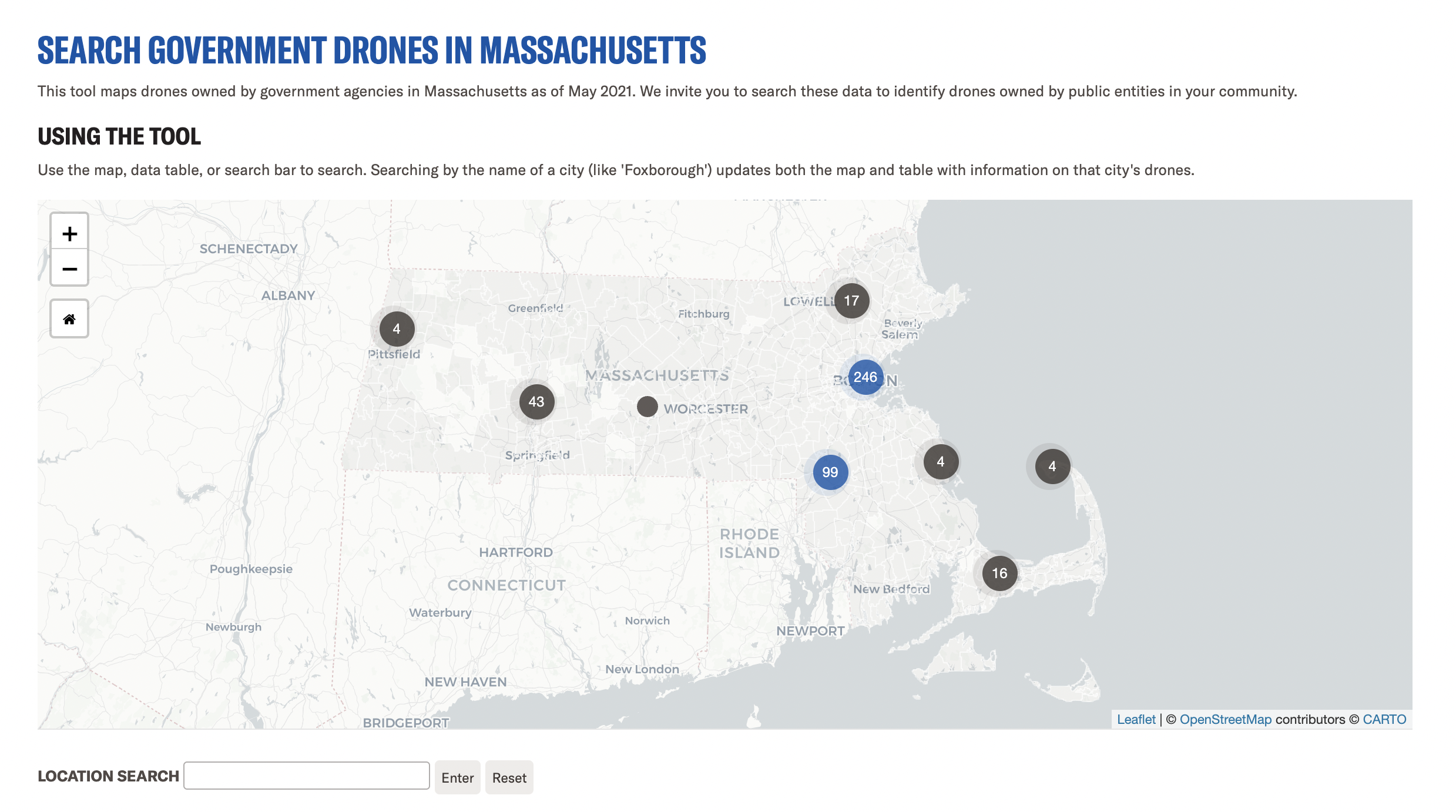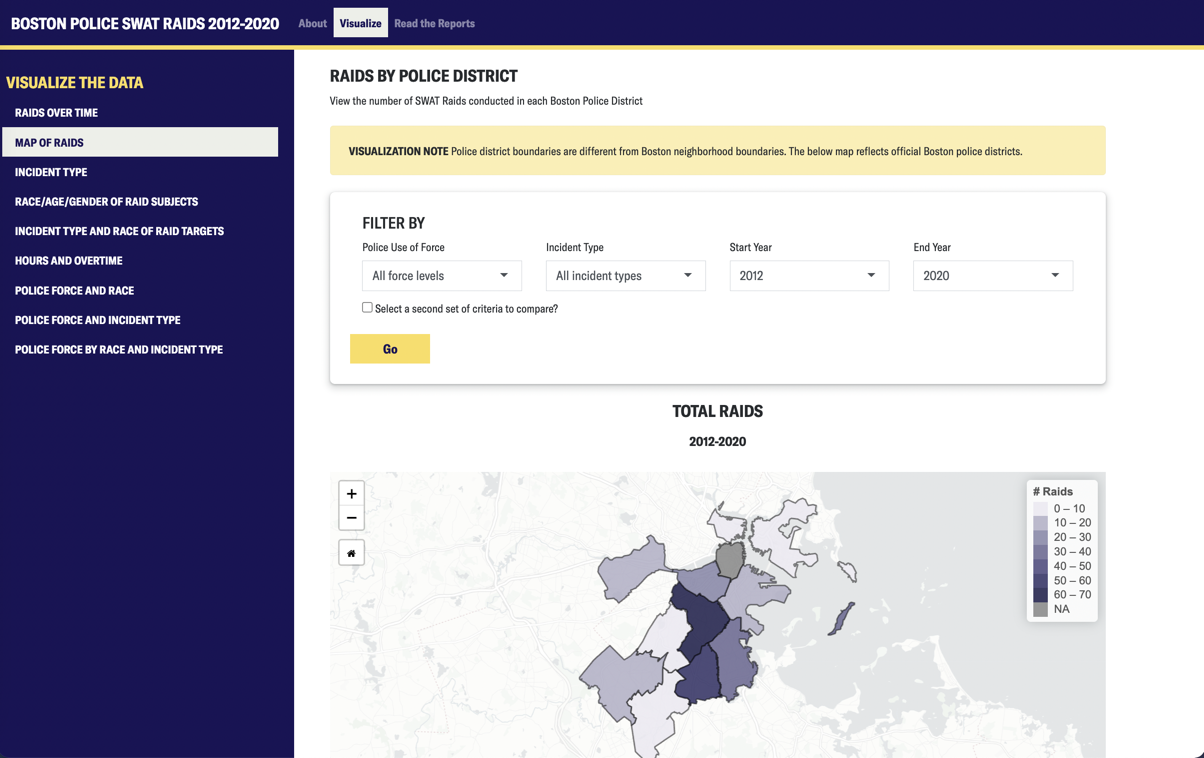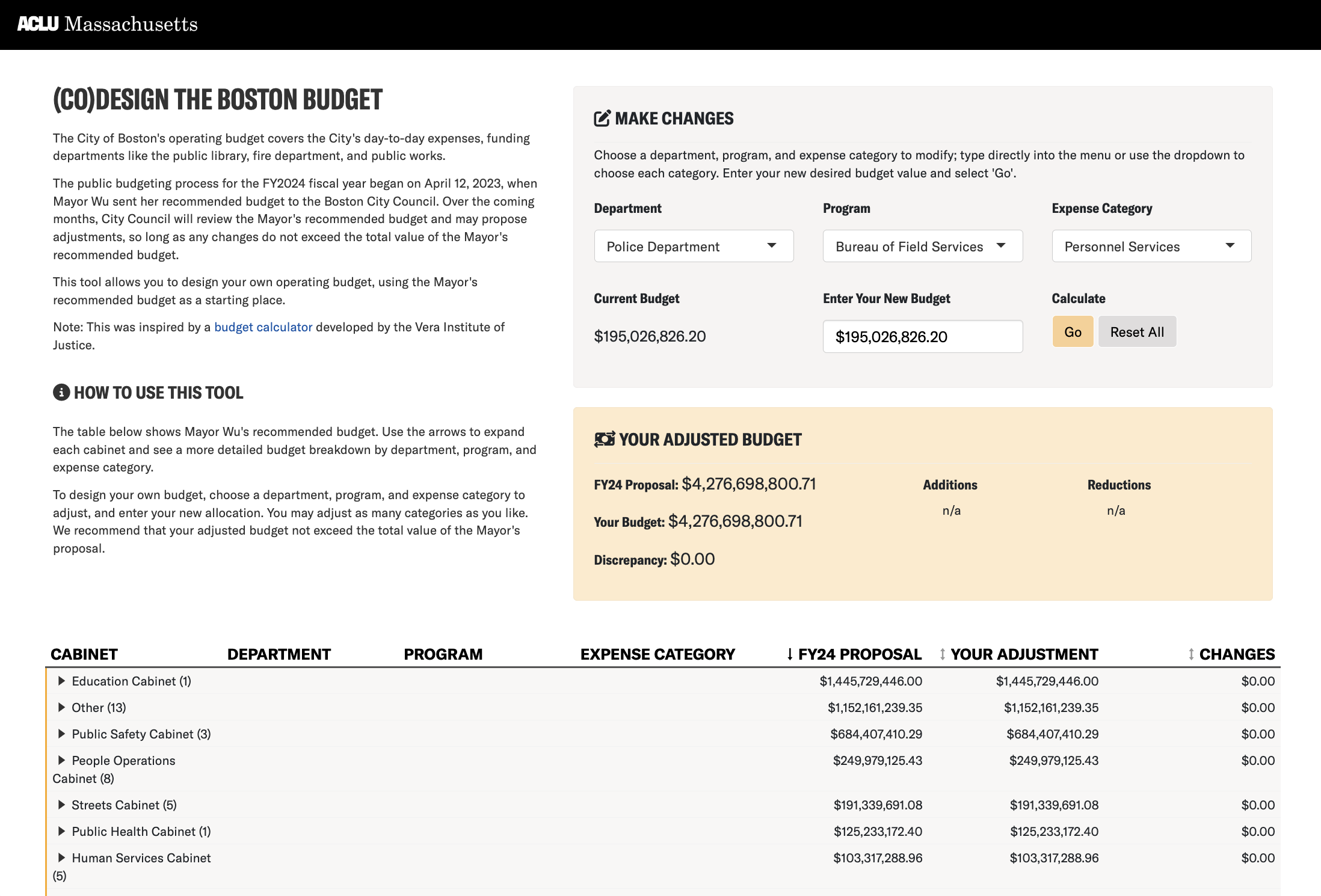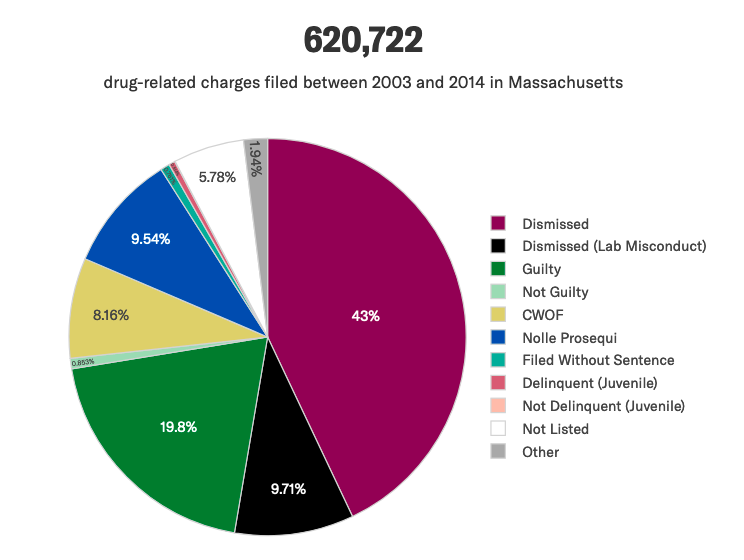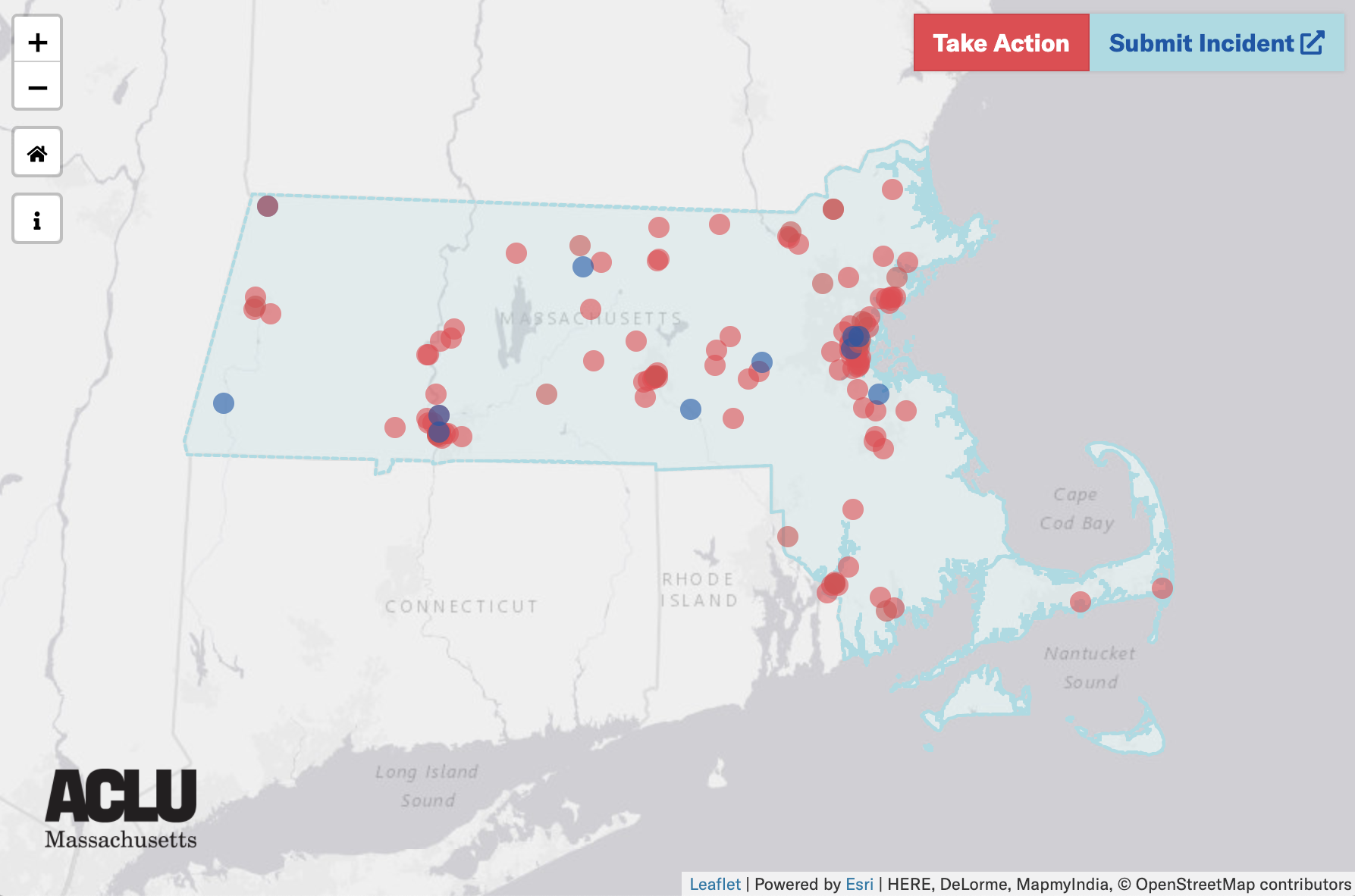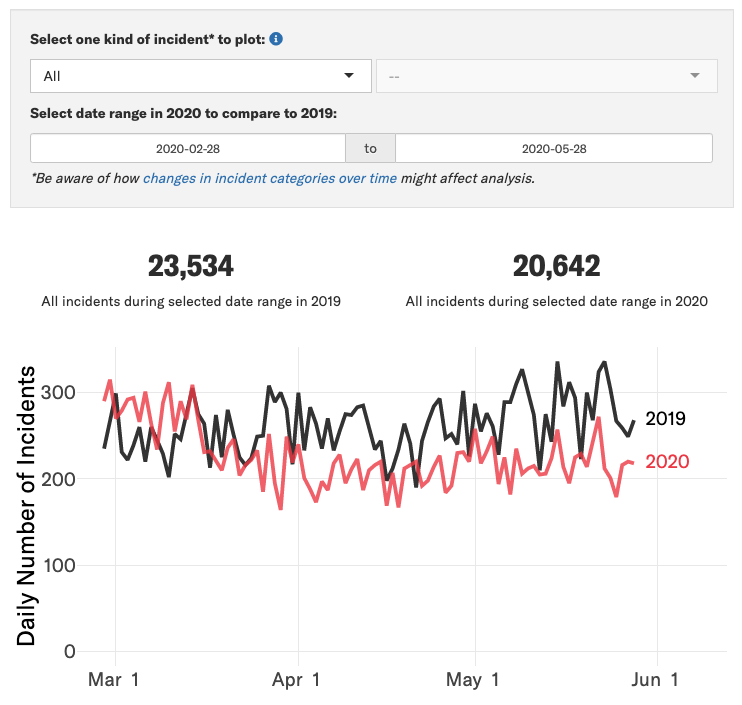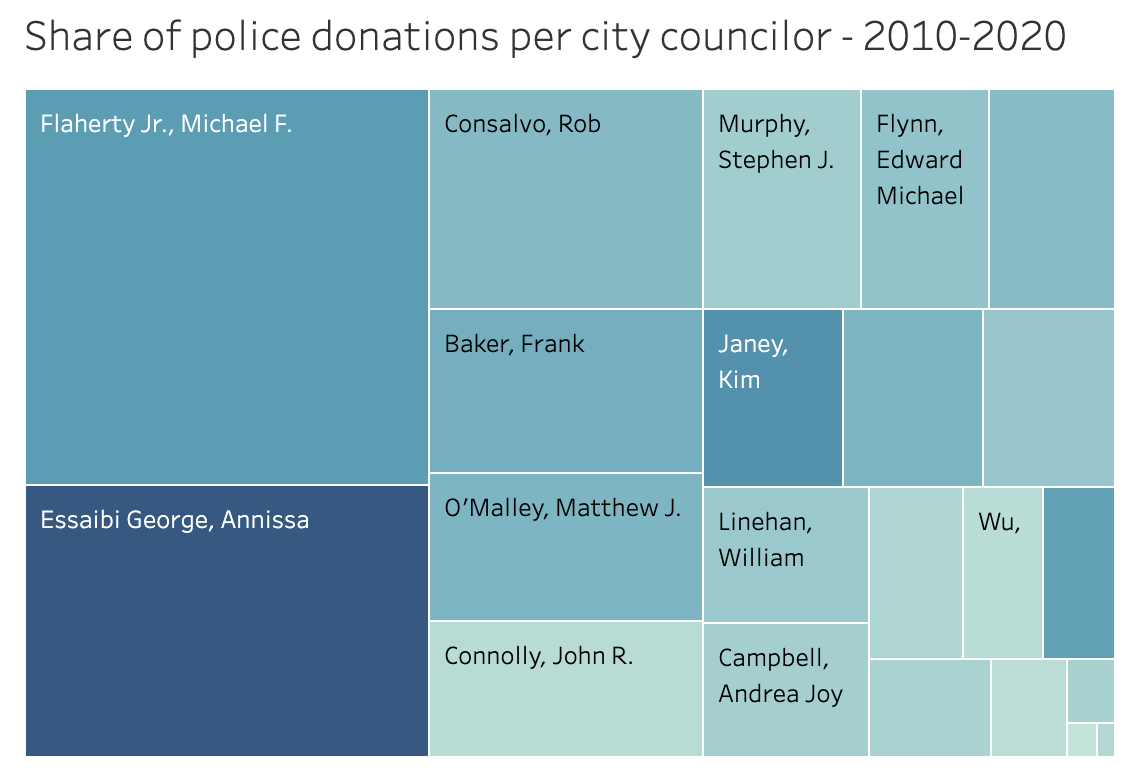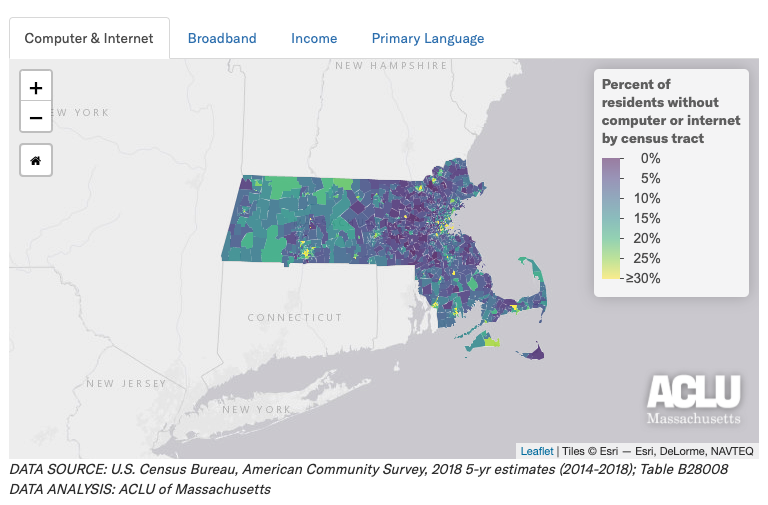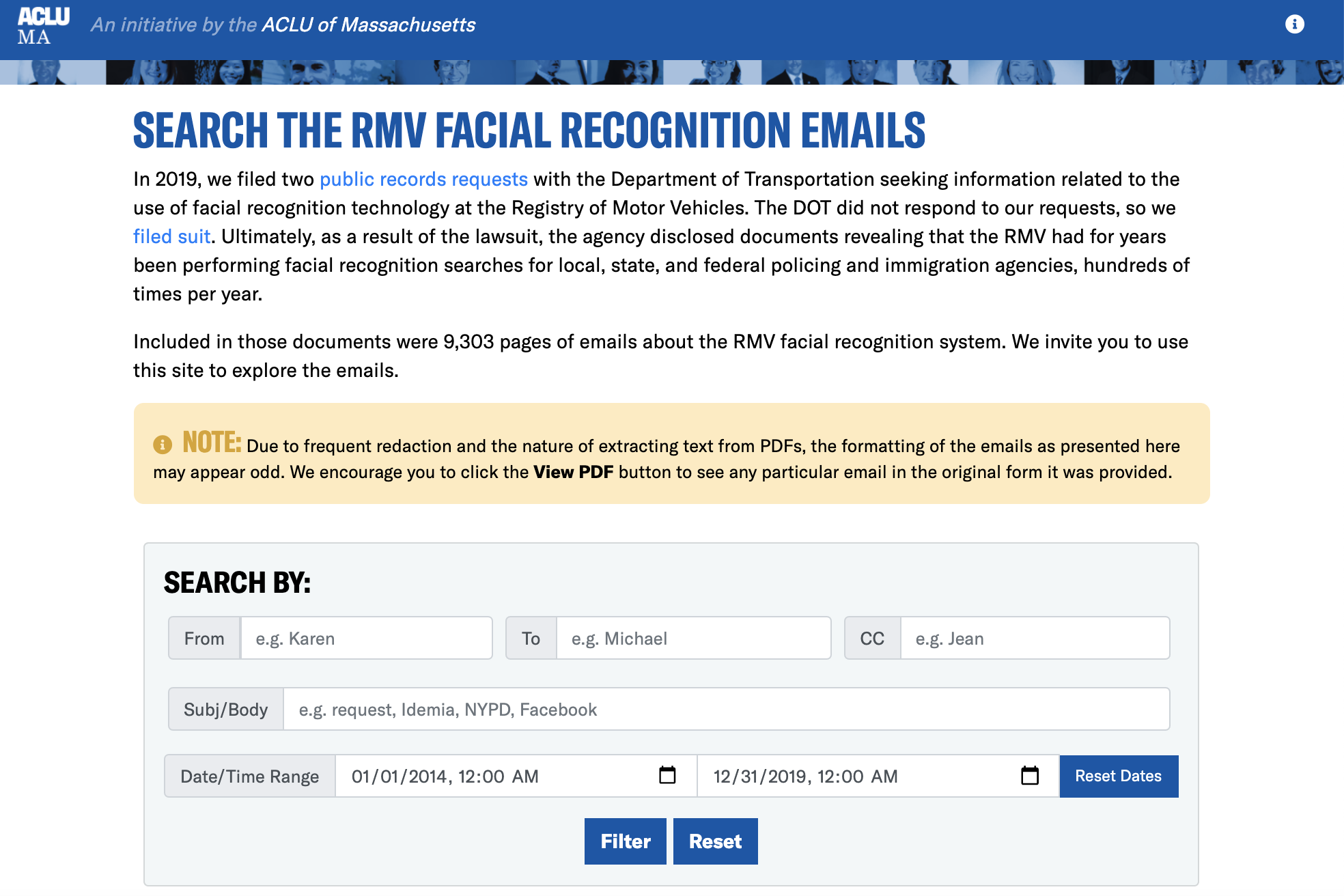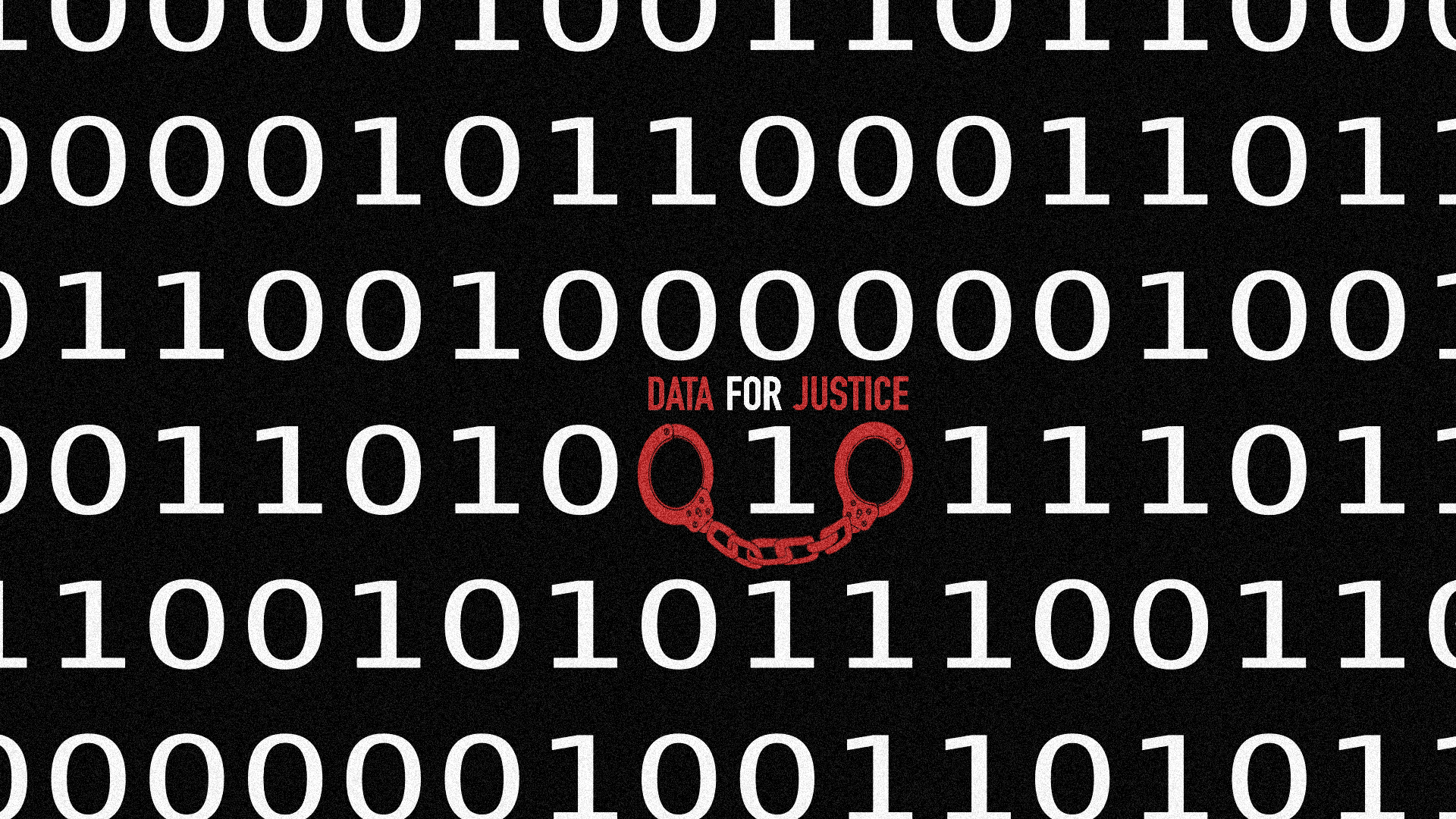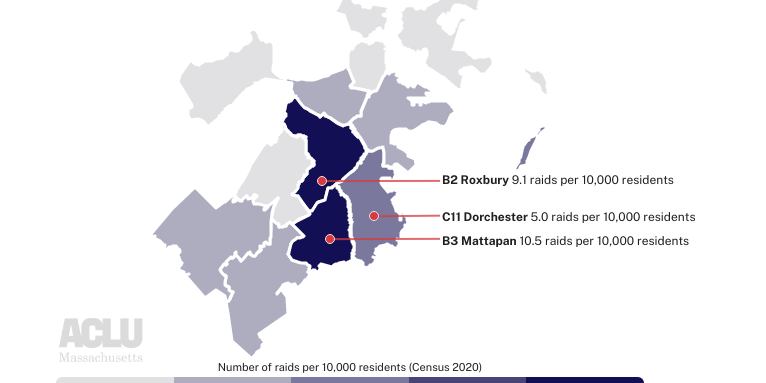Tools
The ACLU of Massachusetts develops interactive tools for users to learn more about and explore government data – including readily available data, data received via public records requests, and data resulting from litigation.
Search Government Drones in Massachusetts (updated)
Explore the presence of government-owned drones in Massachusetts, including those owned by law enforcement. The interactive map and table provide information on drone model types, physical locations, and agency ownership. These data were obtained through a May 2021 public records request to the Federal Aviation Administration and include all active FAA licenses for government-owned drones in the state as of that date.
Reviewing Boston Police SWAT Raids 2012-2020
Review, visualize, and analyze after-action incident reports from the Boston Police Department’s SWAT team. This tool includes data from the 262 raids reported between 2012 and May 2020; these records were made publicly available through a 17F order on BPD militarized tactics in the summer of 2020.
(Co)Design the Boston Operating Budget
The Boston operating budget covers the city’s day-to-day expenses, funding departments like the public library and fire department. Design your own City of Boston operating budget with this budget calculator, which uses the Mayor’s recommended operating budget for fiscal year 2024 as a starting point.
Documenting Drug Prosecution across Massachusetts
Explore the complete record of drug-related criminal charges filed between 2003 and 2014 and prosecuted under MGL Chapter 94C, as documented in data obtained from the Massachusetts Trial Court. These data are made available as a result of a 2017 lawsuit, brought in response to the misconduct of state drug-lab chemist Sonja Farak and subsequent mishandling by the Massachusetts Attorney General’s Office: Committee for Public Counsel Services (CPCS) v. Attorney General.
Tracking COVID-19 in Massachusetts Prisons & Jails
Track testing, positive cases, and releases in prisons and jail during the COVID-19 pandemic, as documented in reports made by Massachusetts prisons and jails to the Supreme Judicial Court (SJC). The data are supplied by county sheriffs and the Massachusetts Department of Correction (DOC) pursuant to the Court’s decision in Committee for Public Counsel Services (CPCS) v. Chief Justice of the Trial Court, SJC-12926.
Mapping Alleged Police Violence & Misconduct
Massachusetts is not immune to police violence and misconduct – and we must demand change. Our map documents incidents of alleged police violence and alleged misconduct that occurred in Massachusetts since 2000, as one portion of our extension Week of Action in support of strong police reform in the Commonwealth.
Tracking Boston Police Incidents
Track the activity of the Boston Police Department over time, including the frequency and location of specific incident types. Police incident reports are publicly available data hosted on Analyze Boston. The reports posted there go back to June 2015, and are (usually) updated daily by the Boston Police.
Police in Politics
Police reform and budgeting has become a high priority in Boston, across the Commonwealth, and nationally. However, engagement by police staff and their unions in state and local politics often acts as an obstacle to meaningful reform. Trace police-related donations to Mayor Walsh and to the Boston City Council from 2010 to 2020 (up to and including the most recent quarter filing), using data from the Massachusetts Office of Campaign and Political Finance.
Mapping Internet Access in Massachusetts
Using data from the Census’ American Community Survey, we map internet and computer access across the Commonwealth. The data show that many urban and rural areas in Massachusetts are “internet deserts”, where access is severely limited.
Reports
The ACLU of Massachusetts regularly publishes reports based on data and documents obtained through the public records law, to inform the public and lawmakers and to advance our civil rights and civil liberties agenda.
Public Records
The ACLU of Massachusetts has filed hundreds of public records requests with various city, state, and federal agencies. On this page, you’ll find requests and responsive documents. These are public records, so please use them however you see fit.
Special Collections
All Requests
Click on a title to learn more about a particular request. Use the arrows and the search bar to help narrow your search
| Title | Submitted To | Category | Number of Documents | Year Filed | Date Published |
|---|---|---|---|---|---|
| Lantel at the Boston Office of Emergency Management | Boston Office of Emergency Management | Surveillance | 266 | 2019 | 2/26/21 |
| Lantel at the Executive Office of Health and Human Services | Executive Office of Health and Human Services | Surveillance | 1 | 2019 | 2/26/21 |
| Lantel at the Executive Office of Public Safety and Security | Executive Office of Public Safety and Security | Surveillance | 2 | 2019 | 2/26/21 |
| Lantel at the Executive Office for Administration and Finance | Executive Office for Administration and Finance | Surveillance | 0 | 2019 | 2/26/21 |
| Lantel at the Massachusetts Bay Transit Authority (MBTA) | Massachusetts Bay Transit Authority (MBTA) | Surveillance | 2 | 2019 | 2/26/21 |
| Lantel at the Massachusetts State Police | Massachusetts State Police | Surveillance | 14 | 2019 | 2/26/21 |
| DataWorks at the Executive Office of Public Safety and Security | Executive Office of Public Safety and Security | Surveillance | 7 | 2019 | 2/26/21 |
| Morpho at the Executive Office of Health and Human Services | Executive Office of Health and Human Services | Surveillance | 2 | 2019 | 2/26/21 |
| IBM at the Springfield Police Department | Springfield Police Department | Surveillance | 2 | 2020 | 2/26/21 |
| Briefcam at the City of Boston (2019) | City of Boston | Surveillance | 7 | 2019 | 2/26/21 |
| MA Police Departments Receiving Solicitations from Clearview AI | Various Police Departments | Surveillance | 102 | 2020 | 2/26/21 |
| MA Police Departments with No Records from Clearview AI | Various Police Departments | Surveillance | 445 | 2020 | 2/26/21 |
| Clearview AI at the Agawam PD | Agawam PD | Surveillance | 3 | 2020 | 2/26/21 |
| Clearview AI at the Andover PD | Andover PD | Surveillance | 4 | 2020 | 2/26/21 |
| Clearview AI at the Boston PD | Boston PD | Surveillance | 0 | 2020 | 2/26/21 |
| Clearview AI at the Beverly PD | Beverly PD | Surveillance | 1 | 2020 | 2/26/21 |
| Clearview AI at the Marlborough PD | Marlborough PD | Surveillance | 1 | 2020 | 2/26/21 |
| Clearview AI at the Salem PD | Salem PD | Surveillance | 3 | 2020 | 2/26/21 |
| Clearview AI at the Somerset PD | Somerset PD | Surveillance | 2 | 2020 | 2/26/21 |
| Clearview AI at the Wellesley PD | Wellesley PD | Surveillance | 3 | 2020 | 2/26/21 |
| Clearview AI at the Yarmouth PD | Yarmouth PD | Surveillance | 1 | 2020 | 2/26/21 |
| Clearview AI at the Bourne PD | Bourne PD | Surveillance | 1 | 2020 | 2/26/21 |
| Clearview AI at the Dalton PD | Dalton PD | Surveillance | 0 | 2020 | 2/26/21 |
| Clearview AI at the Falmouth PD | Falmouth PD | Surveillance | 4 | 2020 | 2/26/21 |
| Clearview AI at the Great Barrington PD | Great Barrington PD | Surveillance | 0 | 2020 | 2/26/21 |
| Clearview AI at the Harvard PD | Harvard PD | Surveillance | 1 | 2020 | 2/26/21 |
| Clearview AI at the Norfolk Sheriff's Office | Norfolk Sheriff's Office | Surveillance | 0 | 2020 | 2/26/21 |
| Clearview AI at the Oxford PD | Oxford PD | Surveillance | 3 | 2020 | 2/26/21 |
| Clearview AI at the Sudbury PD | Sudbury PD | Surveillance | 2 | 2020 | 2/26/21 |
| Clearview AI at the West Bridgewater PD | West Bridgewater PD | Surveillance | 11 | 2020 | 2/26/21 |
| Clearview AI at the Foxbourugh PD | Foxbourugh PD | Surveillance | 1 | 2020 | 2/26/21 |
| Clearview AI at the Massachusetts State Police (MSP) | Massachusetts State Police (MSP) | Surveillance | 5 | 2020 | 2/26/21 |
| Briefcam at the City of Boston (2020) | City of Boston | Surveillance | 3 | 2020 | 2/26/21 |
| COPLINK Facematch at the Massachusetts State Police | Massachusetts State Police (MSP) | Surveillance | 1 | 2019-2020 | 2/26/21 |
| EOPSS Grants for Surveillance Tech in MA Schools | Executive Office of Public Safety and Security | Surveillance | 2 | 2019 | 2/26/21 |
| Face Recognition in MA Schools | Various School Districts | Surveillance | 1 | 2019 | 2/26/21 |
| Face Recognition in Revere Public Schools | Revere Public Schools | Surveillance | 23 | 2019 | 2/26/21 |
| Face Recognition at the Department of Criminal Justice Information Services (DCJIS) | Department of Criminal Justice Information Services (DCJIS) | Surveillance | 4 | 2019 | 2/26/21 |
| Face Recognition at the Executive Office of Public Safety and Security | Executive Office of Public Safety and Security | Surveillance | 1 | 2019 | 2/26/21 |
| Face Recognition at the Massachusetts State Police (MSP) | Massachusetts State Police (MSP) | Surveillance | 7 | 2018 | 2/26/21 |
| Known Use of Face Recognition at the Massachusetts State Police (MSP) | Massachusetts State Police (MSP) | Surveillance | 7 | 2019 | 2/26/21 |
| Massachusetts State Police (MSP) Use of Face Recognition at the Registry of Motor Vehicles (RMV) | Massachusetts State Police (MSP) | Surveillance | 1 | 2019 | 2/26/21 |
| Face Recognition at the MA Sheriff's Association [2019] | MA Sheriff's Association | Surveillance | 1 | 2019 | 2/26/21 |
| Face Recognition at the MA Sheriff's Association [2018] | MA Sheriff's Association | Surveillance | 0 | 2018 | 2/26/21 |
| Face Recognition at the Massachusetts Bay Transit Authority (MBTA) | Massachusetts Bay Transit Authority (MBTA) | Surveillance | 0 | 2018-2019 | 2/26/21 |
| Face Recognition at the Department of Transportation (DOT) | Department of Transportation (DOT) | Surveillance | 380 | 2019 | 2/26/21 |
| Face Recognition at the Executive Office of Health and Human Services | Executive Office of Health and Human Services | Surveillance | 0 | 2019 | 2/26/21 |
| Face Recognition at the Department of Criminal Justice Information Services (DCJIS) | Department of Criminal Justice Information Services (DCJIS) | Surveillance | 0 | 2019 | 2/26/21 |
| Massachusetts State Police Access to Fusion Center Booking Database | Massachusetts State Police (MSP) | Surveillance | 4 | 2017 | 2/26/21 |
| MA Police Departments with No Records on Face Recognition (2018-2019) | Various Police Departments | Surveillance | 26 | 2018-2019 | 2/26/21 |
| Facial Recognition at the Cambridge PD | Cambridge PD | Surveillance | 1 | 2018 | 2/26/21 |
| Facial Recognition at the Medford PD | Medford PD | Surveillance | 2 | 2019 | 2/26/21 |
| Facial Recognition at the New Bedford PD | New Bedford PD | Surveillance | 1 | 2018 | 2/26/21 |
| Facial Recognition & COPLINK at the Northampton PD | Northampton PD | Surveillance | 8 | 2019 | 2/26/21 |
| Suspect Technologies and the Plymouth PD | Plymouth PD | Surveillance | 1 | 2018 | 2/26/21 |
| Facial Recognition at the Plymouth PD | Plymouth PD | Surveillance | 0 | 2019 | 2/26/21 |
| Facial Recognition at the Revere PD | Revere PD | Surveillance | 5 | 2018 | 2/26/21 |
| Facial Recognition at the Salem PD | Salem PD | Surveillance | 2 | 2019 | 2/26/21 |
| Facial Recognition at the Springfield PD | Springfield PD | Surveillance | 14 | 2019 | 2/26/21 |
| Facial Recognition at the Peabody PD | Peabody PD | Surveillance | 1 | 2019 | 2/26/21 |
| Location of Surveillance Cameras Across Boston | City of Boston | Surveillance | 0 | 2019 | 2/26/21 |
| Video Surveillance Data Sharing in Boston | City of Boston | Surveillance | 1 | 2019 | 2/26/21 |
| Boston Security Camera Strategy Meetings | City of Boston | Surveillance | 1 | 2019 | 2/26/21 |
| Federal Funds for the BRIC and OEM | City of Boston | Law Enforcement | 32 | 2020 | 7/22/20 |
| DEA and FBI Face Surveillance Records | Federal & State Law Enforcement | Surveillance | Ongoing production | 2019 | 6/17/20 |
| MA Dept. of Public Health COVID-19 Response | Massachusetts Department of Health | Public Health | 5 | 2020 | 5/7/20 |
| Face Recognition in Revere Public Schools | Revere Public Schools | Surveillance | 22 | 2019 | 2/19/20 |
| State Audit of Bristol Sheriff | Bristol County Sheriff’s Office | Law Enforcement | 1069 | 2019 | 12/5/19 |
| Use of Robotics in Law Enforcement | Massachusetts State Police | Law Enforcement | 7 | 2019 | 11/25/19 |
| Boston Police Department Collaboration with ICE | Boston Police Department | Immigration | 10 | 2019 | 10/26/19 |
| Towing Profits by Massachusetts Dept. of Public Utilities | Massachusetts Department of Public Utilities | Law Enforcement | 10 | 2019 | 9/27/19 |
| Surveillance Cameras and Associated Technologies in the Metro Boston Area | Boston Office of Emergency Management | Surveillance | 2 | 2019 | 9/4/19 |
| Records Regarding Face Surveillance Technology | Northampton Police Department | Surveillance | 15 | 2019 | 6/27/19 |
| Minutes from Boston Area Homeland Security Meetings | Boston Metro Homeland Security Region | Law Enforcement | 25 | 2018 | 6/25/19 |
| Plymouth Police Face Surveillance Emails | Plymouth Police Department | Surveillance | 3 | 2018 | 5/6/19 |
| SWAT Team Deployments ↗ | Northeastern Massachusetts Law Enforcement Council | Law Enforcement | 119 | 2012 | 3/18/19 |
| Boston Police Filming Protesters at BPDA meeting | Boston Police Department | Surveillance | 2 | 2017 | 7/19/18 |
| Massachusetts Use of Facial Recognition Technology | Massachusetts State Police | Surveillance | 6 | 2017 | 7/19/18 |
| New Bedford Field Interrogation and Observation Reports | New Bedford Police Department | Law Enforcement | 17 | 2015 | 7/19/18 |
| Social Media Monitoring by Boston Police | Boston Police Department | Surveillance | 3 | 2016 | 7/10/18 |
| Administrative Subpoena Use by District Attorneys | Various Commonwealth District Attorney's | Surveillance | 31 | 2017 | 7/9/18 |
| Drone Use by Boston Police Department | Boston Police Department | Surveillance | 4 | 2017 | 7/9/18 |
| Info about First Responder Network Authority | Massachusetts Executive Office of Public Safety & Security | Surveillance | 15 | 2015 | 6/19/18 |
| Short-Term Detention and Cooperation with CBP and DHS | Wilmington Police Department | Law Enforcement | 7 | 2015 | 6/19/18 |
| Info about Metropolitan Law Enforcement Council | Metropolitan Law Enforcement Council | Law Enforcement | 9 | 2015 | 6/19/18 |
| Regional Interagency Mutual Aid Organizations Between Law Enforcement | Various Commonwealth Police Departments | Law Enforcement | 12 | 2014 | 6/19/18 |
| Mass DOT's Use of Facial Recognition Technology | Massachusetts Executive Office of Transportation | Surveillance | 6 | 2014 | 6/19/18 |
| Administrative Subpoena Use Across the Commonwealth | Attorney General & District Attorney Offices | Surveillance | 44 | 2013 | 6/19/18 |
| National Guard Resources and Records | Massachusetts National Guard | Law Enforcement | 5 | 2013 | 6/19/18 |
| Relationship Between Police and Drug Enforcement Administration | Various Commonwealth Police Departments | Law Enforcement | 15 | 2013 | 6/19/18 |
| Procurement for Urban Areas Security Initiative | Boston Office of Emergency Management | Surveillance | 29 | 2013 | 6/19/18 |
| Information about Joint Terrorism Task Force and Todashev Case | FBI | Law Enforcement | 34 | 2013 | 6/19/18 |
| Information about Joint Terrorism Task Force & Todashev Case | US Attorney for Massachusetts | Law Enforcement | 29 | 2013 | 6/19/18 |
| SWAT & Special Ops Deployment History | Various Commonwealth Police Departments | Law Enforcement | 38 | 2013 | 6/12/18 |
| Surveillance Technology in Schools | Various Commonwealth Public Schools | Surveillance | 28 | 2010 | 6/12/18 |
| Asset Forfeiture by Suffolk County District Attorney | Suffolk District Attorney | Law Enforcement | 9 | 2015 | 6/11/18 |
| Passenger Tracking Information | MBTA & Transit Police | Surveillance | 13 | 2012 | 6/11/18 |
| Information About DoD 1033 Program | Massachusetts State Police | Law Enforcement | 7 | 2012 | 6/11/18 |
| Use of Administrative Subpoenas | Various Commonwealth District Attorney's | Law Enforcement | 57 | 2011 | 6/11/18 |
| Use of Automatic License Plate Readers | Massachusetts Executive Office of Public Safety & Security | Law Enforcement | 66 | 2011 | 6/11/18 |
| Surveillance of Protected Activity | Boston Police Department | Law Enforcement | 8 | 2011 | 6/11/18 |
| Obtaining Historical Cell Phone Location Data | Various Commonwealth Police Departments | Surveillance | 17 | 2011 | 6/11/18 |
| Use of Facial Recognition Technologies | Various Commonwealth Police Departments | Law Enforcement | 38 | 2010 | 6/11/18 |
| TSA Use of Screening Technologies | Transportation Security Administration | Surveillance | 52 | 2010 | 6/11/18 |
| Purchase Info from Urban Areas Security Initiative (UASI) | Office of Emergency Preparedness | Law Enforcement | 46 | 2010 | 6/11/18 |
| Information About the Joint Terrorism Task Force | US Attorney for Massachusetts | Law Enforcement | 89 | 2009 | 6/11/18 |
| EOPSS Fusion Center Intelligence Sharing Information | Massachusetts Executive Office of Public Safety & Security | Law Enforcement | 9 | 2010 | 6/11/18 |
| EOPSS Fusion Center Information | Massachusetts Executive Office of Public Safety & Security | Law Enforcement | 49 | 2005 | 6/11/18 |
| Officer Barry Flanders & Cooperation with the JTTF | Federal & State Law Enforcement | Law Enforcement | 0 | 2002 | 6/11/18 |
| CBP Title 42 Expulsions | U.S. Customs and Border Protection | Immigration | 5 | 2021 | 10/1/21 |
| Plymouth County Sheriffs Department Records | Plymouth County Sheriffs Department | Law Enforcement | 33 | 2021 | 1/10/22 |
| Department of Unemployment Assistance: Use of Facial Recognition and ID.me | Department of Unemployment Assistance | Surveillance | 24 | 2021 | 1/26/22 |
| Drone use by Massachusetts State Police | Massachusetts State Police | Surveillance | 132 | 2021 | 12/19/22 |
Data
In the table below, find data sets related to criminal justice, public spending, and more. Click the name to learn more about each dataset, visit the corresponding public records request (if applicable), and download the data files for your own analysis.
In addition to data obtained by the ACLU, we’ve included links to relevant external sources of information.
| Name | Data Origin | Year Published | Category | Data Host |
|---|---|---|---|---|
| National Police Scorecard ↗ | Various (FBI, Bureau of Justice Statistics, US Census Bureau...) | 2021 | Law Enforcement | Police Scorecard |
| Massachusetts Crime Statistics ↗ | Massachusetts Executive Office of Public Safety and Security | 2020 | Law Enforcement | MA EOPSS |
| Woke Windows: A Comprehensive Database on the Boston Police ↗ | Various | 2020 | Law Enforcement | Woke Windows Project |
| Massachusetts Traffic Citations 2014-2019 (Temporarily Removed) | Massachusetts Department of Transportation | 2020 | Law Enforcement | Data for Justice |
| 2013-14 Suffolk County Prosecution Data | Suffolk County District Attorney's Office | 2019 | Law Enforcement | Data for Justice |
| Massachusetts State Spending ↗ | Comptroller of the Commonwealth of Massachusetts | 2019 | Fiscal management | MA Comptroller |
| City of Boston Spending ↗ | City of Boston | 2019 | Fiscal management | Analyze Boston |
| Stanford Open Policing Project ↗ | Stanford Computational Policy Lab | 2019 | Law Enforcement | Stanford Open Policing Project |
| Boston Police Crime Incident Reports ↗ | Boston Police Department | 2018 | Law Enforcement | Analyze Boston |
| Data from Social Media Monitoring by Boston Police | Boston Police Department | 2018 | Surveillance | Data for Justice |
| Department of Defense 1033 Program | Defense Logistics Agency | 2018 | Law Enforcement | Data for Justice |
| Police Arrest Data for Commonwealth of Massachusetts | Massachusetts Police Departments | 2018 | Law Enforcement | Data for Justice |
| Field, Interrogation, Observation Reports ↗ | Boston Police Department | 2017 | Law Enforcement | Analyze Boston |
| MA Precinct-Level Election Returns | Massachusetts Secretary of State, Elections Division | 2022 | Elections | Data for Justice |
Contact the Data for Justice Project
Please note that we cannot guarantee to provide you with legal services or advice. If you would like to submit an intake request to be viewed by our attorneys, please call (617) 482-3170 between the hours of 9AM and 5PM ET on business days. If you leave a message after hours, someone will get back to you. Thank you.
Privacy Policy
Effective as of: March 12, 2013
The American Civil Liberties Union of Massachusetts and the American Civil Liberties Union of Massachusetts Foundation (collectively, “ACLU of Massachusetts”) have a long history of being at the forefront of protecting individual privacy, and we are particularly committed to protecting the personal information that you provide and entrust to us when using the ACLU of Massachusetts’s websites. This online privacy statement (the “Privacy Statement”) describes how we treat all user data collected by the ACLU of Massachusetts during your visit to the ACLU of Massachusetts Site, both technical data that is automatically collected and voluntarily submitted data. (The ACLU of Massachusetts comprises the American Civil Liberties Union of Massachusetts and the American Civil Liberties Union Foundation of Massachusetts. To learn more about the differences between the two organizations, click this link.
For purposes of this Privacy Statement, the “ACLU of Massachusetts Site” is the website whose home page is www.aclum.org, and includes all web pages whose domain name contains the following: www.aclum.org and some pages of secure.aclu.org where a link to this privacy statement exists. The ACLU of Massachusetts also operates other websites that don’t contain these domain names, such as www.privacysos.org. This Privacy Statement does not apply to those websites (unless those websites specifically link to this Privacy Statement) and the terms of the privacy statements for those other ACLU of Massachusetts websites may differ from the terms of this Privacy Statement. Additionally, this is not the privacy statement for internet sites (e.g. blogs, forums or social networking sites) where ACLU of Massachusetts has a presence that are on websites other than the ACLU of Massachusetts Site. Further, this is not the privacy statement for the websites of the national operations of the ACLU, the American Civil Liberties Union or the American Civil Liberties Union Foundation (“ACLU National”) or for any ACLU local affiliates other than ACLU of Massachusetts, and you should refer to the privacy statements on those organizations’ websites or contact those organizations to learn the manner in which they treat information you provide to them through their websites’ (or provide to them in any manner other than through the ACLU of Massachusetts Site). This also is not the Privacy Statement applicable to websites linked to from the ACLU of Massachusetts Site. See also “Third-Party Functionality” to learn about third-party optional functionality that appears on the ACLU of Massachusetts Site.
The ACLU of Massachusetts may occasionally update this Statement. We will post any changes on this web page, so be sure to check back periodically. If we do make material changes, we will post a notice on our home page that the Privacy Statement has been modified and provide a link to the revised Privacy Statement. Any information that you submit after a change has been posted will be subject to the new provisions.
User Data We Collect
We collect two types of user data: (1) technical data that is automatically collected from all visitors to the ACLU of Massachusetts Site (“Automatically Collected Data”); and (2) data that you voluntarily submit to us (described below under “Voluntarily Submitted Data”).
Automatically Collected Data. We automatically collect and store Internet Protocol (“IP”) addresses and domain names of the originating visitor’s computer on our server and may know some information you have previously provided through cookies. (See the section on “Cookies” below for more information.) We also track the number and frequency of hits per page as well as length of website visit, using IP addresses and/or session cookies. In addition, if you come to the ACLU of Massachusetts Site from a website link, we may also identify the source of that link.
Voluntarily Submitted Data. We may collect and store Voluntarily Submitted Data, including personal data, that you voluntarily provide, such as your name and postal address, phone number, e-mail address, and similar information, and transactional information, such as giving and action-taking history, when you participate in certain activities on the ACLU of Massachusetts Site, including (but not limited to) when you:
• join or renew your membership to the ACLU of Massachusetts;
• make an additional contribution to support the ACLU of Massachusetts;
• sign up for our ACLU of Massachusetts e-mail network;
• send correspondence, place a call, or inform us about a call to your government representative, or send correspondence to a friend (e.g., when you tell-a-friend or send an e-card) or to other targeted representatives through the ACLU of Massachusetts Site;
• register for our message board;
• register online for an event;
• participate in one of our online petitions or surveys;
• post a blog comment;
• submit feedback to the ACLU; or
• participate in any activity that requires your Voluntarily Submitted Data.
When you send correspondence to a friend, your friend’s email address is only captured by us temporarily in order to complete your send request.
Other Collected Data. We also may collect data concerning your use of the ACLU of Massachusetts Site or interest in ACLU of Massachusetts communications such as by using an embedded image in an email in order to track whether you open our email communications and using a URL contained in an email we send to you that enables us to identify that you have taken an action using a webpage. We may use this data for a number of reasons, including taking account of your interests in our work so that you do not have to miss the opportunity for us to inform you about, and offer you the chance to take action concerning, the ACLU of Massachusetts issues you care about most, and in order to simplify the process of your signing petitions and filling out surveys.
Cookies
We collect some data through the use of cookies. Cookies are alphanumeric identifiers that are transferred to your browser on your computer or device and either stored permanently for future access by the transferor (“Long-term Cookies”) or temporarily to facilitate the transferor’s website analysis and functionality (“Short-term Cookies”) or that are transferred temporarily to your computer’s Random Access Memory (“Session Cookies”).
We may transfer a Long-term Cookie in circumstances in which you are notified prior to the cookie being stored. For example, when you select a “remember” option on the ACLU of Massachusetts Site, a Long-term Cookie will be stored on your browser on your computer or device solely for the purpose of automatically filling in the information you have asked to be remembered, for example, automatically filling in your password when you log in to the ACLU of Massachusetts Site or your postal address when you write a letter to your representative.
We may use Session Cookies whenever you visit the ACLU of Massachusetts Site for our website traffic analytics application and the Site’s interactive applications, such as in our online advocacy. Session Cookies last only as long as your browser session. They expire when you close your browser and are not permanently stored on your computer or device. We also use Session Cookies in e-mails containing the HTML-format. If you select “text-only” format preference, emails sent to you will not contain any Session Cookies.
Some of our website analysis and functionality, such as maps and videos, are provided through third-party functionality and require the use of Short-term Cookies. These Short-term Cookies are set to expire within one hour of their being placed on your browser on your computer or device.
Some elective, third-party media functionality on the ACLU Site may also use Cookies. Please see the “Third Parties—Third-Party Functionality” section below.
How We Use The Data We Collect
In addition to the uses described above, we use Automatically Collected Data to identify the source outside of the ACLU of Massachusetts Site of user traffic (for example, umich.edu, or aol.com) so that we can evaluate what content is persuading web users to become involved in the ACLU of Massachusetts’s work. We use Automatically Collected Data, including IP addresses and/ or Session or Short-term cookies, that indicates which sections of the ACLU of Massachusetts Site are most visited so that we can perform website traffic analysis, evaluate the popularity of our different web pages and continue to improve the ACLU of Massachusetts Site. In order to learn which ACLU of Massachusetts website content inspired you to undertake action such as supporting our work protecting free speech, voting rights or reproductive freedom, we also use Automatically Collected Data we gather just prior to and in connection with your submission of Voluntarily Submitted Data by joining or contributing to ACLU of Massachusetts or taking action on any ACLU of Massachusetts webpage. Automatically Collected Data also may be associated with the Voluntarily Submitted Data you provide to us except to detect security intrusions or certain unlawful activity.
We use your Voluntarily Submitted Data for various purposes:
• To fulfill the request for which you specifically provided the data, including sharing the data with its intended recipient (e.g., delivering a petition you sign or a letter you wish to send to the recipient of the petition or letter);
• To analyze actions taken through our website so that we can learn which civil liberties issues prompt you to become involved in the fight to protect our freedom;
• To periodically communicate with you concerning ACLU of Massachusetts matters, such as delivering to you information and updates on our activities and action alerts, unless you opt out of receiving such information and updates;
• To indicate you as the author of any comment you post, including on any ACLU of Massachusetts Site blog or forum, when you opt to identify yourself as the author or when posting such comment requires such identification, and to display any personally identifying or other information you voluntarily include in such comments;
• To personalize the content that you see based on the activities that you have selected on the ACLU of Massachusetts Site;
• To allow you to set and change user preferences;
• To allow you to renew your membership in the ACLU of Massachusetts;
• To offer you other ways to support the ACLU of Massachusetts, including solicitations for additional contributions if you have not opted out of receiving such communications;
• To confirm your contribution to the ACLU of Massachusetts;
• To confirm your registration to an ACLU of Massachusetts event;
• To respond to an inquiry or feedback you have made to the ACLU; and
• To follow up with you with an email specific to an activity you have participated in or intend to participate in.
If your Voluntarily Submitted Data includes a U.S. zip code or state and you are a member, donor or subscriber to ACLU of Massachusetts information, unless you choose otherwise (see Your Ability to Choose below), we may also share your Voluntarily Submitted Data with ACLU National, which may use that information for any purpose for which we may use that information as described in this Privacy Statement and, if you are a member, donor or subscriber to ACLU of Massachusetts and you list as your address a U.S. address that is within the geographic region of another local ACLU affiliate, we may share your information with that local affiliate which may use that information to:
• If you have not opted out, to periodically communicate with you concerning local affiliate matters, such as delivering information and updates on the local affiliate’s activities, action alerts concerning local matters and invitations to local events;
• To confirm your registration to an event;
• To follow up with you with an email specific to an activity you have participated in or intend to participate in; and
• If you have not opted out, to offer you other ways to support the ACLU of Massachusetts, including solicitations for additional contributions.
In some instances when you voluntarily take an action that uses email functionality, you will be alerted immediately following taking that action that you have opted in to receiving further email communications unless you opt out of receiving such communications by unsubscribing. If you voluntarily join a petition that is to be delivered to a third party, such as a governmental figure or agency, we will deliver to that third party the Voluntarily Submitted Data you submit in connection with joining the petition. Additionally, in order to encourage others to participate and show the geographic reach of our supporters, we also may publicize your participation in the petition on the ACLU Site by showing your first name and last initial and the city and state you submit in connection with joining the petition, but not other information you submit in connection with joining, such as your full last name and street or email address.
The ACLU of Massachusetts Site is hosted by servers in the United States. Accordingly, if you are located outside of the United States, the Voluntarily Submitted Data you provide to us will be transferred to the United States. By submitting your Voluntarily Submitted Data, you consent to its transfer and storage in the United States and its use in accordance with the purposes for which it was originally collected (see below regarding third-party sharing of Voluntarily Submitted Data from non-U.S. residents).
If you are a U.S. resident, we may also from time to time combine your Voluntarily Submitted Data with some publicly available data collected from third parties to improve our services to you and for our own internal marketing, communications, and fundraising purposes.
Third Parties
Third Party Sharing
Generally, we do not share Automatically Submitted Data, Voluntarily Submitted Data or Other Collected Data with third parties. However, we do share such data with those third-party service providers who fulfill your orders or transactions, contact you on our behalf, or facilitate some other aspect of ACLU of Massachusetts activities, services or products, including those third-party service providers who collect, process, store and transmit information we collect on this website on our behalf and those third-party service providers we use to assist us in our fundraising and communications efforts. These service providers have access to your Voluntarily Submitted Data solely for the purpose of providing these services to us on our behalf, and they are contractually prohibited from sharing your Automatically Submitted Data and Voluntarily Submitted Data with third parties other than subcontractors assisting them in their providing these services to us who also are contractually prohibited from sharing your Automatically Submitted Data and Voluntarily Submitted Data with any other third parties. Please note that we do not share data from non-U.S. residents with any other third parties (except where required by law, see below), even if a non-U.S. resident has subsequently authorized such use, for example, by checking an opt-in request.
We may also share the Voluntarily Submitted Data of members and donors who are U.S. residents with other non-profit organizations and publications (“Sharing Organizations”), but never to any partisan political groups or to groups whose programs are incompatible with ACLU of Massachusetts policies. We never give your Voluntarily Submitted Data directly to the Sharing Organizations; instead we send the list to a third-party service provider that prepares the communication for the Sharing Organization (and that is contractually bound to use your Voluntarily Submitted Data only for this purpose and not to share it with any third parties other than subcontractors assisting them in their providing these services to us who also are contractually prohibited from sharing our Voluntarily Submitted Data with any other third parties). The Sharing Organizations never see our list and never know what names and related contact information are on it other than the names and contact information of those individuals who respond to the Sharing Organizations’ communication. Exchanging lists can enable the ACLU of Massachusetts to expand our membership base. However, you can choose to opt out of having your data shared. To learn more, read the section on “Your Ability to Choose” below.
Finally, we may disclose and use Voluntarily Submitted Data regardless of where you reside in special circumstances when it is necessary to enforce our User Agreement or this Privacy Statement, or when we, under what we hope to be extraordinary and infrequent circumstances, in good faith, truly believe that the law requires us to disclose your Voluntarily Submitted Data to third parties.
Except as described in this Privacy Statement, we will not share your Voluntarily Submitted Data with any third party unless we first notify you and offer you an appropriate choice to consent to such further use, for example, through an opt-out or opt-in request.
Third-Party Functionality
As discussed in the preceding section, to support certain functions carried out on the ACLU of Massachusetts Site, the ACLU of Massachusetts uses third-party service providers. In limited instances with respect to specific optional functions on the ACLU of Massachusetts Site, these third parties may have data collection, use or security procedures that differ from the practices outlined in this Privacy Statement and that may impact users of those optional functions. For example, a third-party service provider may. allow us to stream videos through the ACLU of Massachusetts Site on an embedded video player (e.g., the YouTube embedded player) and, by viewing that video on the ACLU of Massachusetts Site, you are actually accessing that service provider’s website and subject to its data collection, use or security procedures. This third party may, for example, transfer a Long-term Cookie to your computer when you use this functionality. Please make sure that you review that third party’s procedures prior to using that optional functionality. In cases where it is not clear that you are using a third party’s functionality (i.e., it is not branded as the functionality of a third-party), we will notify you that your use of the functionality is subject to a third party’s data collection, use and security procedures and identify that third party.
Internet Transmission
It is important to note that standard email sent across the internet is unencrypted. While emails ACLU of Massachusetts personnel send to one another within the ACLU of Massachusetts system is encrypted, emails that leave the ACLU of Massachusetts system or are sent to the ACLU of Massachusetts from outside the ACLU of Massachusetts system—including the information in those emails and the email addresses—are not necessarily secure. ACLU of Massachusetts does not, and requires that its third-party service providers that have access to Voluntarily Submitted Data do not, transmit emails outside the ACLU of Massachusetts system that contain Voluntarily Submitted Data unless that information is sent in a secure (e.g., password protected) manner or the ACLU of Massachusetts has your consent.
With your consent, such as when you send emails to or receive emails from ACLU of Massachusetts personnel or you decide to use any ACLU of Massachusetts website email functionality, including Email a Friend, contacting legislators or engaging in other advocacy communications via email, the information transmitted in those communications, including your email address, will be transmitted across the internet in an unencrypted manner.
Coalitions
In furtherance of its mission, the ACLU of Massachusetts forms, works with and joins Coalitions of organizations and individuals collectively working on issues related to the ACLU of Massachusetts’s mission of defending and preserving individual rights guaranteed by the constitutions and laws of this country (“Coalitions”). The ACLU of Massachusetts does not share Voluntarily Submitted Data you submit to the ACLU of Massachusetts Site with those Coalitions unless you have opted in to doing so, including by submitting Voluntarily Submitted Data to the Coalition through the ACLU of Massachusetts Site or by taking an action on the ACLU of Massachusetts Site that is specifically designated as an action of the Coalition (unless it states on the website page where you take such action that Voluntarily Submitted Data will not be shared with the Coalition). Once you have opted in to doing so (or have voluntarily submitted information to a Coalition in any manner other than through the ACLU of Massachusetts Site), that information is information you are submitting to the Coalition itself. Unless specifically stated otherwise on the ACLU of Massachusetts Site with respect to a Coalition action or a collection mechanism for a Coalition, this Privacy Statement does not address the treatment of personal information, including Voluntarily Submitted Data,that is submitted to a Coalition. Please contact the Coalition or review the privacy statement on the Coalition’s website, if it has one, to learn about the treatment of the information you provide to a Coalition.
Your Ability to Choose
When you provide us with your Voluntarily Submitted Data on the ACLU of Massachusetts Site, you can let us know that you do not wish to receive our email communications by unsubscribing to email communications, by un-checking or not checking the subscription request box on the form you are completing, by un-subscribing, un-checking or not checking the subscription request box on our User Preference Page, by unsubscribing from further email communications of a specific type following receipt of an email of that type, or by contacting us via postal mail sent to American Civil Liberties Union of Massachusetts, 211 Congress Street, 3rd Floor, Boston, MA 02110.
You can opt out of having your Voluntarily Submitted Data shared with Sharing Organizations on the online form you are filling out or thereafter by emailing us at action@aclum.org or by contacting us via postal mail sent to American Civil Liberties Union of Massachusetts, 211 Congress Street, 3rd Floor, Boston, MA 02110.
Again, please remember that if you are a non-U.S. resident, we will not use your Voluntarily Submitted Data for any purpose other than the one for which it was originally collected regardless of whether you check or un-check a box.
Children
We do not knowingly collect information from children under the age of 13.
Security
The Voluntarily Submitted Data we collect about you is stored on a secure, password protected server and only authorized personnel have access to your information. We use industry-standard encryption technologies with respect to the receipt and transfer of Voluntarily Submitted Data you submit to us on the ACLU of Massachusetts Site and only authorized personnel have access to your information. Nevertheless, despite our best efforts, no transmission over the Internet and no data storage method can be guaranteed to be 100% secure.
Updating Your Data
To update your Voluntarily Submitted Data or to make corrections, you can do so by using our User Preference Page, or by sending us the update via postal mail sent to American Civil Liberties Union of Massachusetts, 211 Congress Street, 3rd Floor, Boston, MA 02110.
Comments and Questions
If you have any questions, comments or concerns about this Privacy Statement or our data collection practices or to request that we delete your Voluntarily Submitted Data, you can email us at info@aclum.org, or send us your questions or comments via postal mail sent to American Civil Liberties Union of Massachusetts, 211 Congress Street, 3rd Floor, Boston, MA 02110.
About the Data for Justice Project
The Data for Justice Project is an initiative by the ACLU of Massachusetts that aims to make data actionable, empowering lawyers, advocates, community organizers, journalists, activists, and the general public by:
- liberating government data sets and making them available in digestible formats;
- publishing documents obtained through ACLU of Massachusetts public records and Freedom of Information Act requests;
- advocating for open government at the municipal, county, and state levels;
- developing tools and dashboards to make complex data sets accessible to ordinary people; and
- using data to tell stories to advance the ACLU of Massachusetts’ legislative advocacy.
Making real the promise of open government in the digital age
Government transparency is a hallmark of a free, open, and democratic society. In a democracy, the people rule. But it’s hard to advocate for reforms or policy changes when we don’t know what our government is doing. We can’t manage what we don’t measure.
We hope the Data for Justice Project will arm activists, advocates, journalists, policy makers, and elected officials with relevant, timely information about how government functions—so we can fix it when it doesn’t.
Why data matters
A few years ago, the Massachusetts state legislature embarked on an ambitious project to reform the criminal legal system. Legislators were moved by personal stories of injustice, and also by data that revealed the systemic nature of these injustices.
Although Massachusetts incarcerates fewer people per capita than most other states, we have a higher incarceration rate than most countries in the world, and among the worst racial disparities anywhere on earth. These depressing data points helped to move the legislature to take bold action to pass omnibus criminal justice reform that, among other things, eliminated mandatory minimum sentencing for certain drug offenses.
Also tucked in to the omnibus criminal justice reform law was an open data measure backed by the ACLU, mandating that the state Executive Office of Public Safety and Security collect arrest data from every police department statewide, and publish it on a regular basis on the state’s website.
That reform is critical, because despite progress, we still don’t know nearly enough about what our government is doing, especially regarding criminal legal system information about arrests, prosecutions, incarceration, and probation and parole.
Even when we can get our hands on data from the criminal legal system, the information is often messy and difficult to work with — sometimes even locked inside PDF files that need to be OCRed or transcribed by hand into a usable format.
Contributions
The Data for Justice Project is a community resource and public education platform. We encourage data scientists, activists, and others to submit analyses of data sourced from this website, and recommend data sets we should include here. Submission does not guarantee publication. But if your work is compelling, we will work with you to give it a home. For more information, or to get involved, please contact the ACLU of Massachusetts Data for Justice Project at data [at] aclum [dot] org.
Special thanks to Paola Villarreal, who as a Technology Fellow worked with the ACLU of Massachusetts to develop the concept of the Data for Justice Project.
Special Thanks
Home Page
Data for Justice is a project of the ACLU of Massachusetts. We hope the project will arm activists, advocates, journalists, policy makers, and elected officials with relevant, timely information about how government functions—so we can fix it when it doesn’t.
Government transparency is a hallmark of a free, open, and democratic society. In a democracy, the people rule. But it’s hard to advocate for reforms or policy changes when we don’t know what our government is doing.
Learn more about Data for Justice.
We can’t manage
what we don’t measure.
6
interactive tools
113
public records requests
12
reports
13
data sets


